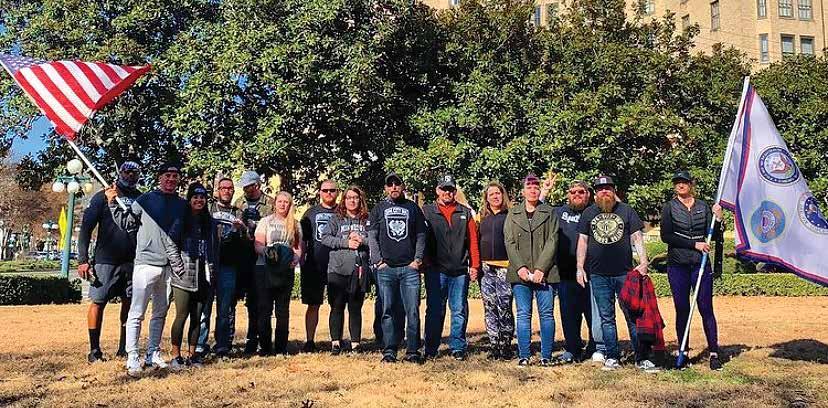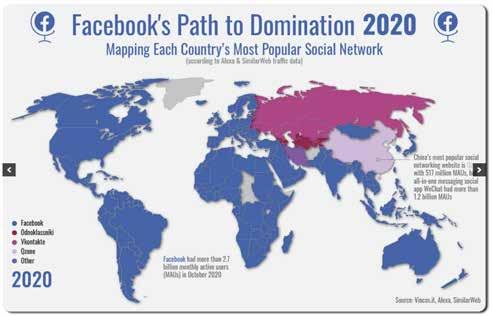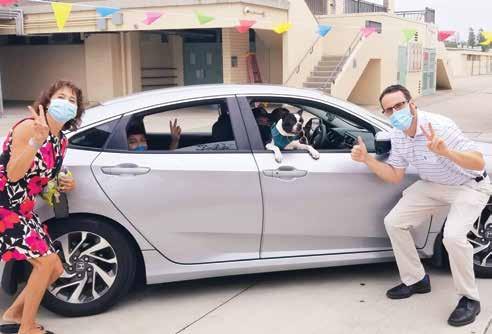
15 minute read
Rancho Penasquitos Jan 2021
Stay Safe, Friends!
VOL. 6 ISSUE 1 3
NEW DINING APP PROMISES TO HELP REVIVE SAN DIEGO’S FOOD SCENE
The Savorite app is here to help restaurants get back to business in a post-pandemic world.
These days, the vibrant pulse of our city’s dining scene feels like a thing of the past. Foodies Jason Cabildo and Cristina Romanillos founded Savorite, a revolutionary new app that is finding ways to help bring diners back to restaurants in a safe and exciting way.


With Savorite, diners can quickly find last minute deals on the best local restaurants near them. Unlike other platforms, Savorite gives restaurants the ability to instantly upload offers of up to 50% off a customer’s total bill to help fill empty tables and increase takeout in real time. This encourages customers to dine out and enjoy great meals while helping restaurants bring in business when they need it most.
So let’s say you’re heading out to eat, but you can’t decide where to go. Open up the Savorite app before you leave home and see what restaurants are offering live deals for the day, choose one that satisfies your craving, book yourselves a table and eat out for a fraction of the price!
“The idea is to help drive traffic during quieter times of the day, when business is typically slow.
When a restaurant has empty tables, those tables are contributing $0 to their bottom-line, but with Savorite, restaurants can maximize their excess capacity and bring in additional income by rewarding
diners who eat at those slow times with reduced prices,” Jason said.
The shift to off-peak dining also allows diners to stay away from the crowds without giving up the experience of dining out. Savorite screens each restaurant added to the platform for safety measures advised by authorities to ensure each one of their users are able to enjoy great meals at great prices with comfort in mind.
“The safety of our community comes first,” Jason said. “If dining out isn’t your thing right now, Savorite enables restaurants to share takeout only deals to keep customers coming even if they’d like a delicious night in.”
Savorite has already teamed up with some of the best local businesses around downtown and has plans to expand to neighborhoods like Hillcrest and North Park to help bring more of its community to restaurants in need.
Whether it’s a brunch of pancakes with friends or a much needed date night, take advantage of last minute offers to help restaurants revive their business.
Local News > LocalUmbrellaNews.com /LocalUmbrellaMedia @LocalUmbrellaMedia Advertise? Press@LocalUmbrella.com
22 VOL. 6 ISSUE 1
Happy New Year, San Diego!

Assemblymember Shirley Weber gives a press conference in the capitol following the passage of her bill AB 392 which would limit the use of deadly force by police in California on July 8, 2019. Photo by Anne Wernikoff for CalMatters
NEXT SECRETARY OF STATE AIMS TO TEACH CALIFORNIANS “HOW FRAGILE THE DEMOCRACY IS”
By Ben Christopher ben@calmatters.org
Seventy years ago, sharecroppers David and Mildred Nash refused to back down in a dispute with a white farmer, and fled from a lynch mob in Hope, Arkansas. With their 2-year-old daughter in tow, they found a new home out west in a place so different her grandfather, who would die without ever being able to vote, called it a “foreign land.”
This year that toddler, Shirley Weber, is slated to become the first Black Californian to become the state’s top election official.
It’s easy to imagine that poignant bit of historical symmetry was on Gov. Gavin Newsom’s mind when he announced Weber’s nomination late last month.
With Joe Biden and California Sen. Kamala Harris on their way to
different wings of the White House, Newsom was given the opportunity — or the headache — of picking Harris’ replacement. Three days before Christmas, the governor finally brought the California-wide guessing game to a close: Secretary of State Alex Padilla would sit out the remainder of Harris’ term and become California’s first Latino U.S. Senator.
Padilla’s appointment opened up its own vacancy. A few hours later, Newsom made another announcement: Weber, a Democratic assemblywoman from San Diego.
The rollout of the one-two appointment was almost certainly meant to appease different constituencies of the state electorate. Latino activists had spent weeks reminding the governor that the state’s largest ethnic group had never been demographically represented the state in
the U.S. Senate. Many Black Democrats and other progressives — Weber among them — urged the governor not to allow Harris’ departure from the Senate to leave the nation’s most esteemed legislative body without a single Black woman.
Weber’s appointment was not widely anticipated like Padilla’s. But her biography indicates life experience relevant to the job of California’s top election administrator. Voting, denied to the Webers in the South, became a precious, fiercely guarded and unfailingly exercised right for the whole family.
Support nonprofit journalism in California
We rely on your generous support to cover the stories that matter most to you. If you find our work valuable in these difficult times, please support our journalism.
A university professor and a school board member before joining the Legislature in 2012, Weber’s most notable legislative achievements have focused on education policy — where she’s often ticked off the state’s teachers unions — new regulations on when police can use lethal force and racial justice. Last year, she carried bills to place a repeal of California’s ban on affirmative action on the ballot (it failed) and to create a committee to study possible reparations for California’s descendants of slaves.
Here’s a conversation with her, condensed and edited for clarity:
Assemblymember Shirley Weber gives a press conference in the capitol following the passage of her bill AB 392 which would limit the use of deadly force by police in California on July 8, 2019. Photo by Anne Wernikoff for CalMatters
Assemblymember Shirley Weber gives a press conference in the capitol following the passage of her bill AB 392 which would limit the use of deadly force by police in California on July 8, 2019. Photo by Anne Wernikoff for CalMatters
Q: We all saw the video of the call in which the governor offered Secretary Padilla the job. I’m curious, did you receive a phone call? Was it an email? What was that ask like for you?
A: I didn’t have the same experience that Padilla had with the tears and so forth and so on. I had gotten a phone call I think the night before when the governor made his decision as to what he was going to do.
Q: Was this something that you were pushing for? Were you seeking out the position?
A: No, no. It was not even on my radar, initially. It was not something I was pushing for, not something that I had asked for. I know others had….I knew there were others who had been called in to discuss the position…I was approached in a very general way — a “what do you want to do with your life?” sort of conversation. But I didn’t connect the dots that it was about the secretary of state position until it became more apparent.
Q: You’ve accomplished a lot in the Legislature. When you were offered the position was there a voice in the back of your mind saying, “I don’t necessarily want to leave this behind”? Or were you ready to jump on it?
A: You know, whether you’re in the Assembly or at a university or any of the various other things I’ve done, you kind of come to the realization of your own mortality, that this won’t last forever. And I only have another term (in the Legislature) to go…then I’m termed down.
But I always recognized the fact that you have to do what you can while you’re there, and you have to make it count. But equally important, at least in my world, is that you have to empower other people to do the work. Because most folks are afraid to take on the challenges that I took on, OK? What I have always tried to teach, to demonstrate to others, is that you can be a change agent, you can be the voice, you can be that strongback, you can be that person and still have the respect of everybody in the room…So if I can spark that in the (legislative) members that are there now, and they’re doing some of it and if I can even support them in some of their efforts — you know, because I’ll be just across the street — that would be worth it.
Q: Do you remember who that was?
A: (Thinking) Who wanted to be a badass…? Oh, it was (Assemblymember Kevin) McCarty (a Democrat from Sacramento). That was early on in the game. He’s a badass now.
A: So how do you plan to be a badass at the secretary of state’s office then? What are your priorities?
I’m hoping that we will continue this change to make sure that voting is accessible to everyone and that there are various ways that people can vote.
I also want to focus on civic education. I look at what kids know and even what adults know about the elected positions and voting and the balance of power. All of those things have really become civic lessons in the last four years!…So I’m looking at ways in which we can, in addition to all the stuff we normally do, help people have a good, strong civic lesson about voting, about democracy, about the relationship between the states and federal government.
You know, I had one member come to me and say, “I want to be a badass like you.” I said, “I didn’t know I was! I’m just a little old lady.”
I’m not sure if our folks truly understand it. Because if you did, you would be vigilant about voting, you would understand how fragile the democracy is, and you would understand what tyranny is.
I had a worker on my campaign in 2012. He was probably in his 40s or 50s. He worked really hard on my campaign. He was on corners every morning waving signs. And one day, after working on the campaign so long, he said to me, “this is the first time in my life I really wish I could vote.” I said, “Why can’t you vote?” He whispered and said, “I’m an ex-felon.”
And I said, “You can vote!” He was shocked. So we registered him to vote and he voted. And I realized that there were just an awful lot of people in our district who didn’t know that once you have done your time, you have the right to vote. Not like some of the southern states.
So I said when I get to Sacramento, I’m going to deal with that. And that was one of the first bills I did (legislation requiring state and county officials to inform those released from jail or prison of their voting rights). And as I was walking around Sacramento, I would mention it to people and very, very important lobbyists would say, “People who are ex-felons can vote?”
Q: Maybe it’s not surprising given your background, but you seem to view this job as another opportunity to be a teacher — this time for 40 million people.
A: Education is in my soul. I’ve been a teacher since I was 5 years old on my mother’s back porch in the projects. I did everybody’s homework because I was stupid (laughing) and I love doing homework!
Q: When you were growing up, when your family came to California from Arkansas, was voting a big part of your family tradition?
A: Oh, definitely. My dad came in ‘51. That was before the Voting Rights Act. People knew very clearly in the South that you didn’t try to register to vote because you could be killed. So my father was not a registered voter. Neither was my grandfather. And after my father had to flee the South, when he came to California, among some of the first things he did was to register to vote. He and my mom voted in every election there ever was.
My mother volunteered at the polls when we were in elementary school. She became one of the poll workers and eventually she became a supervisor at the polls. When my elementary school could no longer allow folks to vote in the auditorium because of the free and reduced lunch programs (which required the school to make) space for the kids to eat, my mother said, ‘Well, you guys can vote at our house.’ So our house became the polling place at 351 West 45th Street…We all knew as kids that on those days when voting took place, you leave through the backdoor and you come in through the backdoor because the people in the living room were doing important business — like voting.
Q: You were pretty vocal in pushing the governor to select a Black woman for Senator Harris’ soon-to-be-vacant seat. You told Erika Smith at the L.A. Times that you would be “very, very, very upset” if Newsom did not —
A: And I am. I’m still upset and I’m still concerned…I met with the (Legislative) Black Caucus and one of the things I insisted that we do was send another letter to the governor saying that we still want a seat. If a seat becomes available, we want a Black woman’s voice in it because there are none in the Senate.
California may have another opportunity, depending on (Democratic Sen. Dianne) Feinstein. If she runs again or if she resigns or whatever she does — if there’s a change, we still want a Black woman. But in addition to that, it’s also the responsibility of the 48 other states. Only one other state here in America, Illinois, has also had a female African American (U.S. senator).
But the governor knows I’m still very, very, very upset. Alex Padilla has done amazing work. But I still want to emphasize the fact that representation does matter. You know, having been on God, I can’t tell you how many boards and commissions
where I was the only (Black woman) in the room, I think I made a difference. Because when issues came up, I had an experience that none of the others had and that is being a Black woman who has been the victim of the system being supported.
Assemblymember Shirly Weber has been named California Secretary of State after current Secretary Alex Padilla was named to the U.S. Senate this morning. Photo by Anne Wernikoff, CalMatters; Wikimedia Commons
Newsom’s two big picks make history for California by advancing Latino and Black Democrats
In choosing a new U.S. senator and a new secretary of state, Gov. Gavin Newsom could shape Democratic politics for years to come.
Q: Among those playing the guessing game about the open Senate seat, I think there was a view that if the governor was to pick Padilla — which he did — he had to then offer the secretary of state position to a Black woman. As if one were a kind of compensation for the other.
A: Yeah, it’s not at all. These are totally different realities…(I’ve had people say) ‘Congratulations, Shirley, you’re gonna do a great, great job, blah blah blah. But we still want a Senate seat.” And I say, “Amen. We do.”…(Because U.S. Senators are not subjected to term limits unlike state constitutional offices) the long term effect of having a Senate seat is extremely important and it’s a voice in that arena. They’re not interchangeable.
Q: Your daughter (Akila Weber, who sits on the La Mesa city council) announced that she’ll be running for your Assembly seat once you leave it. Did you encourage her to get into politics?
A: I would never try to get anybody to go into politics because that’s something you have to want to do…I never stopped going to meetings because I had children. So my kids learned to take their coloring books and sit in the corner while we had board meetings.
(Akila ran for student body president of her elementary school). Her principal, who I knew, called me and says, “Girl, I am shocked…I have never had a sixth grade president come into my office and say, ‘Here is the agenda. Could you make copies for the meeting?’” … She’s always been a leader type.
Q: Have you given her any campaign advice?
A: The only advice that I’d ever give my daughter is: Don’t lose your sense of integrity; never become so angry that you become ineffective. There’s always a way to get things done.
Ben Christopher Ben covers California politics and elections. Prior to that, he was a contributing writer for CalMatters reporting on the state's economy and budget. Based out of the San Francisco Bay Area, he has written for San Francisco magazine, California magazine, the San Francisco Chronicle, and Priceonomics. Ben also has a past life as an aspiring beancounter: He has worked as a summer associate at the Congressional Budget Office and has a Master’s in Public Policy from the University of California, Berkeley.
90 % OF INTERESTEDPROSPECTS will visit your website after receiving your direct mail piece. Then what?
S
SmartMail
M
1. Your prospects receive your mail piece
2. They visit your website
3. They see your ads all over the internet until they become a customer






How do you increase your chances of converting that 90%?
An omnichannel campaign with DirectMail integration! Here’s how it works for you and your prospects:
SocialMatch
They start seeing Facebook® & Instagram® ads for your business
Informed Delivery
You’ll get emails with a black & white copy of the mailed letter
Mail Tracking Then they each receive a high-quality postcard—you get notified exactly when this happens
SmartMail
SmartMail
Call Tracking They start calling; you’ll know exactly who’s calling as a result of your mailing
Online Follow Up After visiting your website, they start seeing your ads via Google® Display
Social Media Follow-Up …they’ll continue to see your ads on social media
LEADMatch
Meanwhile, you’ll see who visited your website — because of your mailing — and who was there separately. Then you can send mail to those unique visitors who weren’t on your mailing list!
CONTACT: Brad Weber Brad@LocalUmbrella.com
(619) 300-1732
Local News > LocalUmbrellaNews.com /LocalUmbrellaMedia @LocalUmbrellaMedia Advertise? Press@LocalUmbrella.com










